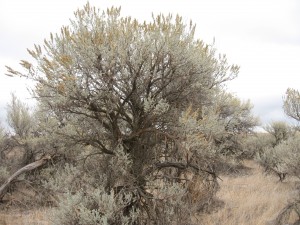Plant Species:
Stiff Sage, Thistle Trees, Cheap Grass, Bear Grass, Reeds (only by water)
I imagine its harder for life to grow on top of this rock, its in much more direct sunlight, further away from water, and the wind is much more strong on top of the plateau.
Rocks:
Basalt is the most common rock, that is what the entire plateau is made of. The basalt is in two major colors on top of the plateau, the dark red and back. There are some other lighter stones as well, most likely pumice, or other minerals left by the receding waters of the last flood. The longitudinal grooves in the rock are present but much harder to spot in person, than in Google Earth.
Animals:
Golden Eagle, Sparrows, Spiders, Cows, Hornets, Bees,
Small bones of dead rodents were visible from animal scat, from a hawk or an owl.
General Notes:
The fact that there is less water here than in the park means more of a desert landscape, and that was true. The sage grows everywhere, as if it was an invasive species, the smell is present in every breath. Other plants are very scarce, unless its grass, or smaller more colorful plants growing right in the edge of the plateau. Cow patties fertilize the whole land, some were fresh so cows must be close, if rock was something tat could be fertilized. Little dry basins, where water was once held are scattered throughout the plateau with reeds growing in a ring around the basin. There are small mounds of dirt every 20 ft or so, with black basalt surrounding them, and then branching off to surround other mounds. They look like little roads from above.


